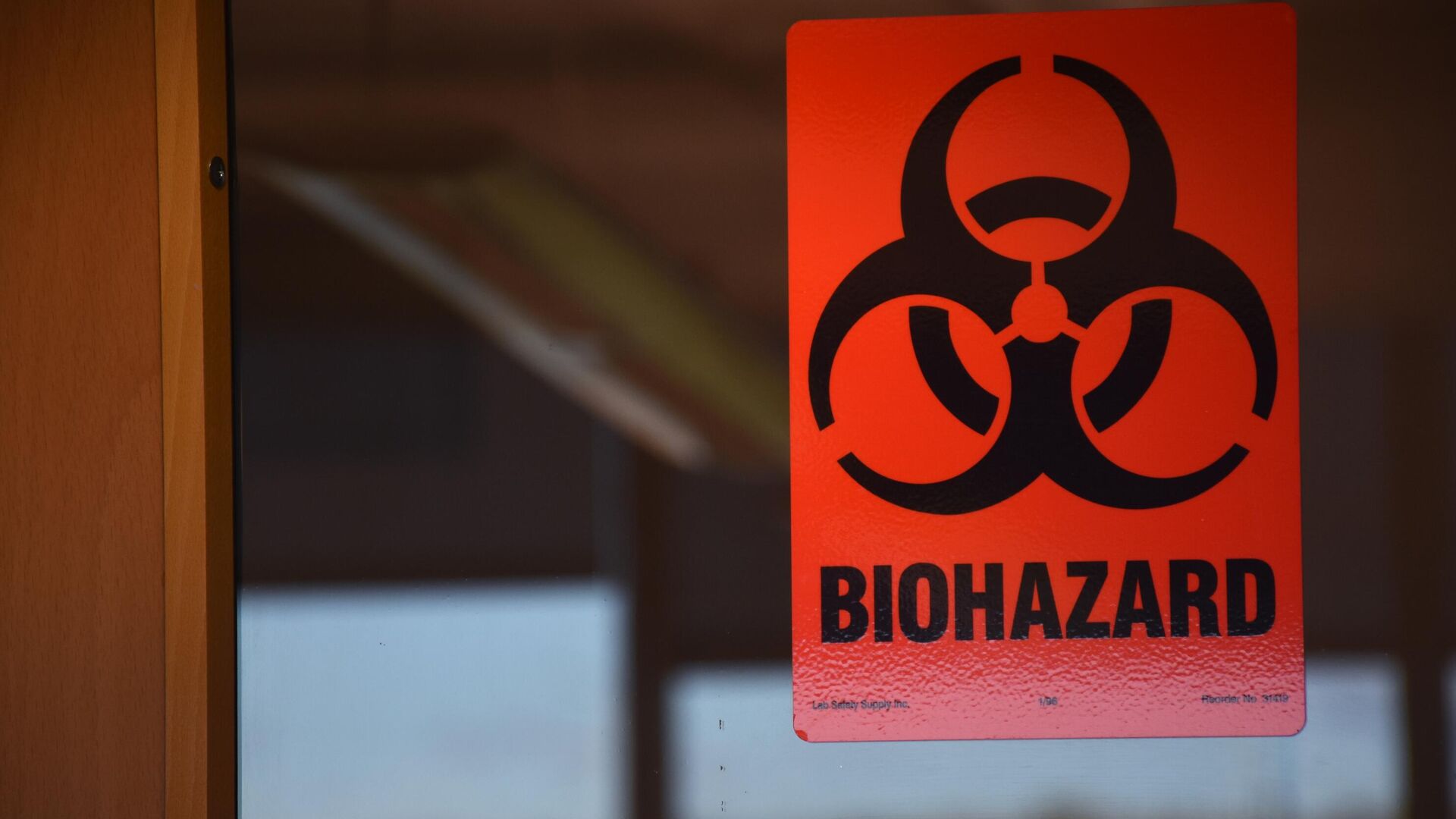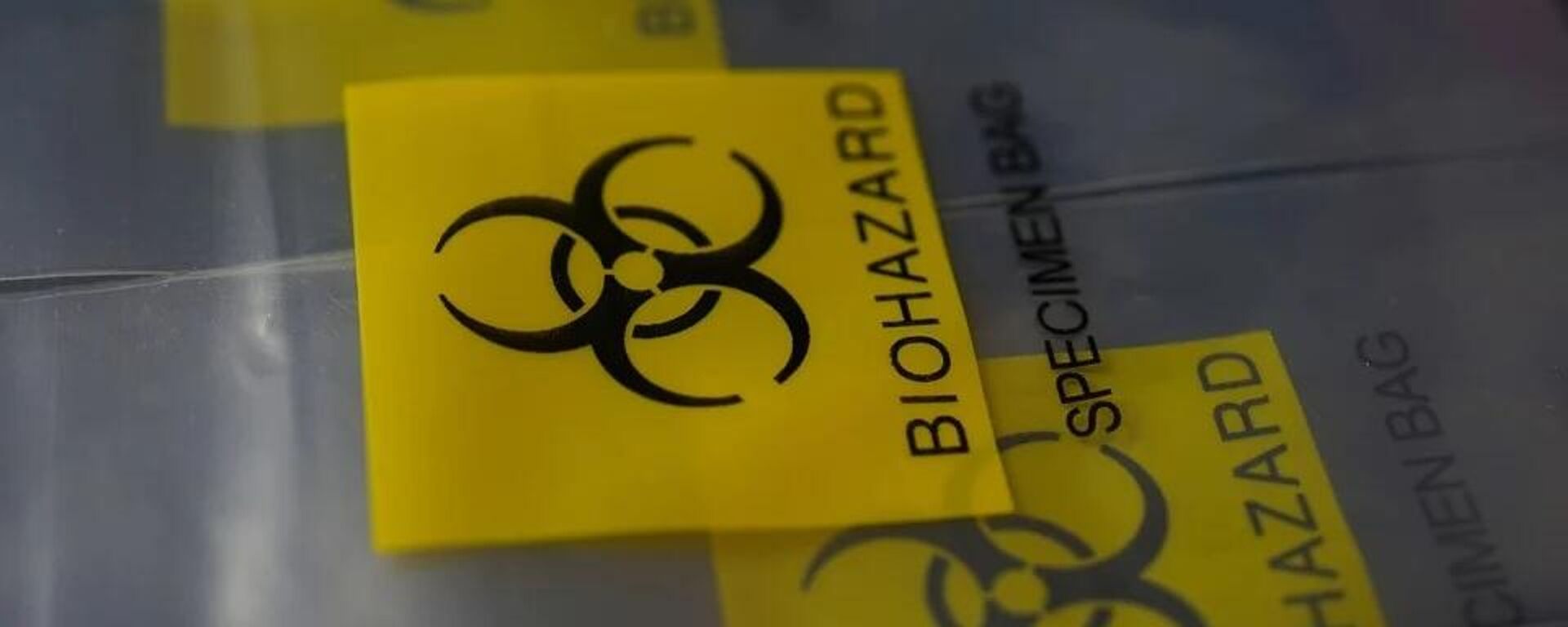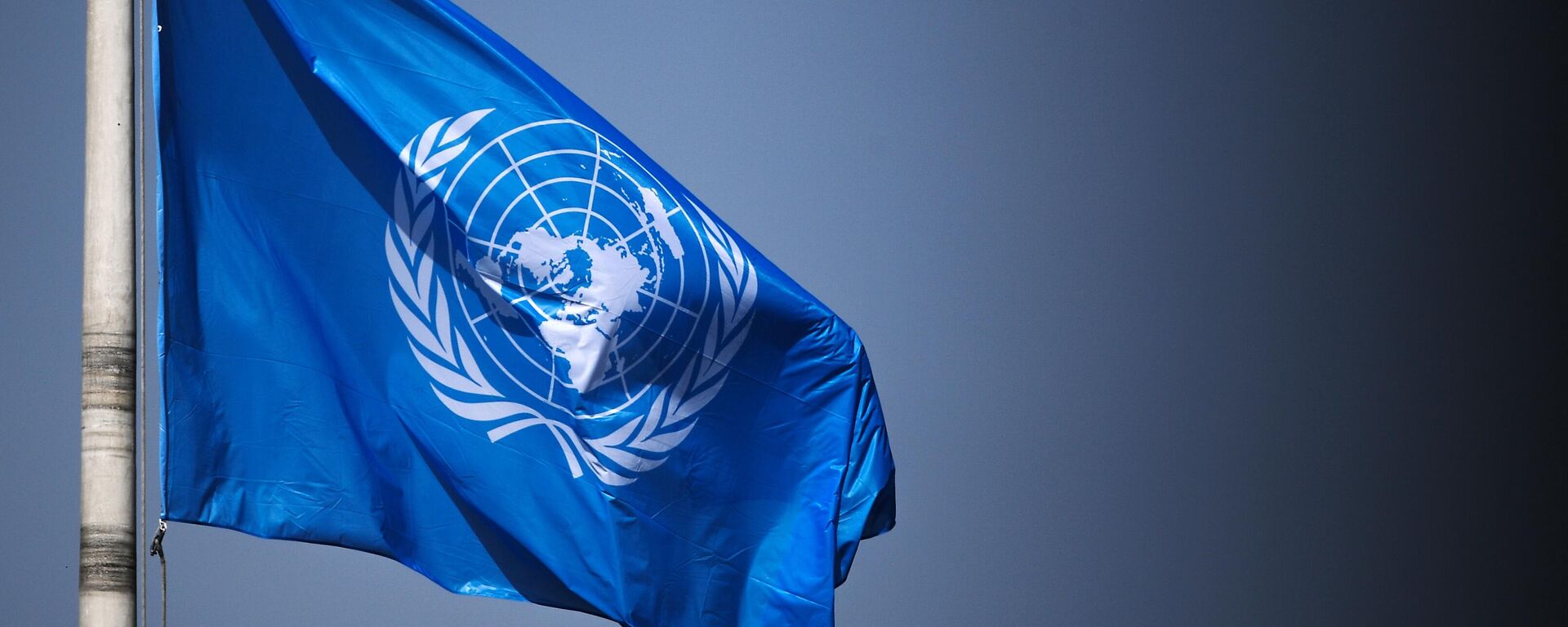https://en.sputniknews.africa/20231010/experts-urge-african-govts-to-probe-us-biological-research-activities-on-the-continent-1062672966.html
Experts Urge African Gov'ts to Probe US Biological Research Activities on the Continent
Experts Urge African Gov'ts to Probe US Biological Research Activities on the Continent
Sputnik Africa
On Monday, a Russian Defense Ministry report raised concerns that the United States is allegedly transferring its dual-use biological research to Africa, where... 10.10.2023, Sputnik Africa
2023-10-10T18:20+0200
2023-10-10T18:20+0200
2023-10-10T18:20+0200
united states (us)
ukraine
republic of the congo (congo)
uganda
cameroon
sierra leone
russia
biotechnology
biological weapon
russian ministry of defense
https://cdn1.img.sputniknews.africa/img/07e7/08/1c/1061693776_0:191:2963:1858_1920x0_80_0_0_c03588ad0c08507a025d6aeb32116b5d.jpg
If the reports about the transfer of American dual-use biological research to Africa are true, it will be a matter of "major concern" given the negative impact such a move will have on the African continent, David Monyae, Associate Professor of Political Science and International Relations and Director of the Centre for Africa-China Studies (CACS) at the University of Johannesburg in South Africa, told Sputnik Africa in an interview.Lt. Gen. Igor Kirillov, the chief of the Russian Armed Forces' nuclear, biological and chemical protection troops, revealed in a Monday report that the US has shifted its dual-use biological research activities to Africa after being exposed by Russia in Ukraine and the European region last year.Citing documents available to the Russian Defense Ministry, Kirillov said that Washington has transferred some of its dual-use biological research activities to some African countries, including the Democratic Republic of Congo, Sierra Leone, Cameroon, Uganda and South Africa.He also noted that the US Defense Threat Reduction Agency (DTRA), the US National Security Agency, and the US Department of State are the clients of the alleged US government dual-use biological research activities in Africa.In this regard, Prof. Monyae argued that African officials should ensure that these US research activities are "in line with Africa's own research request or resolving Africa issues," otherwise they should "completely reject such a move as they do the presence of foreign forces on the continent."According to Dr. Ntsikelelo Breakfast, a senior lecturer at the Department of History and Political Studies at Nelson Mandela University in South Africa, the US shifting its biological research to Africa is not surprising, given that Washington is seeking to expand its influence on the African continent, which he described as a "strategic place" that has always been a "geopolitical battleground" between "great powers" because of its resources.Dr. Breakfast added that he expects Washington, in pursuit of its agenda, to locate some of its "military, biological research" in universities in host countries. He did not rule out the possibility that some US multinational companies might be involved, since "they stand to benefit, obviously".Breakfast noted that the "concern is with regard to the ethical issues" of this kind of dual-use biological research, especially when multilateral bodies such as the World Health Organization turn a blind eye to such activities.According to Dr. Breakfast, global organizations should provide oversight and control measures regarding such a biological research initiative that poses the risk of "a possible violation of human rights". He argued that "there are ethical issues that I think people are concerned about that speak to issues of human rights".In a similar vein, Prof. Monyae noted that there have been some attempts by Russia to draw attention to suspicious US biological research in various regions of the world at the level of multilateral structures, such as the UN. However, these attempts were rebuffed by Washington.He added that the vast majority of African countries do not have the "capacity to get in to fully understand and comprehend the nature of these biological issues if it is to be proven to be true."Given the fact that Russia has been investigating American biological activities for several years, Prof. Monyae suggested that Moscow share the evidence in its possession with the international community to initiate a large-scale investigation involving more actors, including African researchers. According to the professor, such an international effort would demonstrate the danger and negative consequences of this kind of research.
https://en.sputniknews.africa/20231009/us-moves-biological-dual-use-research-to-africa-russian-mod-reveals-1062648524.html
https://en.sputniknews.africa/20231005/russia-urges-to-improve-un-chiefs-mechanism-for-investigating-use-of-chemical-weapons-1062555457.html
united states (us)
ukraine
republic of the congo (congo)
uganda
cameroon
sierra leone
russia
central africa
east africa
Sputnik Africa
feedback@sputniknews.com
+74956456601
MIA „Rossiya Segodnya“
2023
Muhammad Nooh Osman
https://cdn1.img.sputniknews.africa/img/07e7/04/0a/1058467512_0:0:1280:1280_100x100_80_0_0_ec723833bcbfcaed2e21952965ad99e4.jpg
Muhammad Nooh Osman
https://cdn1.img.sputniknews.africa/img/07e7/04/0a/1058467512_0:0:1280:1280_100x100_80_0_0_ec723833bcbfcaed2e21952965ad99e4.jpg
News
en_EN
Sputnik Africa
feedback@sputniknews.com
+74956456601
MIA „Rossiya Segodnya“
Sputnik Africa
feedback@sputniknews.com
+74956456601
MIA „Rossiya Segodnya“
Muhammad Nooh Osman
https://cdn1.img.sputniknews.africa/img/07e7/04/0a/1058467512_0:0:1280:1280_100x100_80_0_0_ec723833bcbfcaed2e21952965ad99e4.jpg
united states (us), ukraine, republic of the congo (congo), uganda, cameroon, sierra leone, russia, biotechnology, biological weapon, russian ministry of defense, international, central africa, east africa
united states (us), ukraine, republic of the congo (congo), uganda, cameroon, sierra leone, russia, biotechnology, biological weapon, russian ministry of defense, international, central africa, east africa
Experts Urge African Gov'ts to Probe US Biological Research Activities on the Continent
Muhammad Nooh Osman
Writer/Editor
On Monday, a Russian Defense Ministry report raised concerns that the United States is allegedly transferring its dual-use biological research to Africa, where it's believed to be conducting illegal and dangerous experiments with potential bioweapons agents in African countries, as well as Ukraine and other regions.
If the reports about the transfer of American
dual-use biological research to Africa are true, it will be a matter of "major concern" given the negative impact such a move will have on the African continent,
David Monyae, Associate Professor of Political Science and International Relations and Director of the Centre for Africa-China Studies (CACS) at the University of Johannesburg in South Africa, told
Sputnik Africa in an interview.
"It would be a matter of African governments and through the AU to do more investigation to understand the nature and character of such a move before accepting the activities of biological [research] given the lack of capacity on the African continent and the pandemics that has been taking place. So this will indeed bring major worry," he said.
Lt. Gen. Igor Kirillov, the chief of the Russian Armed Forces' nuclear, biological and chemical protection troops,
revealed in a Monday report that the US has shifted its dual-use biological research activities to Africa after being
exposed by Russia in Ukraine and the European region last year.
Citing documents available to the Russian Defense Ministry, Kirillov said that Washington has transferred some of its dual-use biological research activities to some African countries, including the Democratic Republic of Congo, Sierra Leone, Cameroon, Uganda and South Africa.
He also noted that the US Defense Threat Reduction Agency (DTRA), the US National Security Agency, and the US Department of State are the clients of the alleged US government dual-use biological research activities in Africa.
In this regard, Prof. Monyae argued that African officials should ensure that these US research activities are "in line with Africa's own research request or resolving Africa issues," otherwise they should "completely reject such a move as they do the presence of foreign forces on the continent."
According to Dr. Ntsikelelo Breakfast, a senior lecturer at the Department of History and Political Studies at Nelson Mandela University in South Africa, the US shifting its biological research to Africa is not surprising, given that Washington is seeking to expand its influence on the African continent, which he described as a "strategic place" that has always been a "geopolitical battleground" between "great powers" because of its resources.
"They've got military bases in Africa," Breakfast told Sputnik Africa. "So the way I understand this development is that this military biological research will be subsumed into the military of the US. Of course, with the strong footprint in Africa now, the foreign policy of the US has always been driven by national interests in pursuit of its hegemonic project."
Dr. Breakfast added that he expects Washington, in pursuit of its agenda, to locate some of its "military, biological research" in universities in host countries. He did not rule out the possibility that some US multinational companies might be involved, since "they stand to benefit, obviously".
Breakfast noted that the "concern is with regard to the ethical issues" of this kind of dual-use biological research, especially when multilateral bodies such as the World Health Organization turn a blind eye to such activities.
"So it does back the question as to why, for instance, a multilateral organization like the World Health Organization has not expressed its views surrounding this issue. Is it because the World Health Organization as a subset of the UN is keeping quiet because the budget that they have, the bulk of it comes from the UN, which is largely funded by the US? Therefore, they cannot bite the hand that feeds them," the academic said.
According to Dr. Breakfast, global organizations should provide oversight and control measures regarding such a biological research initiative that poses the risk of "a possible violation of human rights". He argued that "there are ethical issues that I think people are concerned about that speak to issues of human rights".
"What is the position of the UN, in particular, the World Health Organization? Do they have any concerns?" Dr. Breakfast questioned. "It's quite concerning that they've been quiet about this, but they are tasked with a responsibility to make sure that the ethical issues regarding biological research are addressed every time the scientific community wants to uncover about something. So I'm just taken aback. I'm disappointed that they have not said anything regarding this matter."
In a similar vein, Prof. Monyae noted that there have been some
attempts by Russia to draw attention to suspicious US biological research in various regions of the world at the level of multilateral structures, such as the UN. However, these attempts were rebuffed by Washington.
"When it comes to Africa, there is a need for fairness that you cannot be present in any territory without the consent of the people in that particular jurisdiction," Monyae said. "The number of factors that need to be involved, transparent, going with democracy, awareness by the majority of people in these territories to know exactly activities that are taking place in that land given the negative impact as has happened in so many other areas to avoid disasters without any mitigating issue."
He added that the vast majority of African countries do not have the "capacity to get in to fully understand and comprehend the nature of these biological issues if it is to be proven to be true."
Given the fact that Russia has been investigating American biological activities for several years, Prof. Monyae suggested that Moscow share the evidence in its possession with the international community to initiate a large-scale investigation involving more actors, including African researchers. According to the professor, such an international effort would demonstrate the danger and negative consequences of this kind of research.
"So there are a lot of investigations required, the involvement of Africans on the ground, and to ensure that all scientific bodies governing the activities of biological issues are [involved]. I think in South Africa during the COVID era, there has been those kinds of cases. It's of major worry, and I do not think it's something that should be accepted, whether it's coming from the United States or any other country," Monyae concluded.




